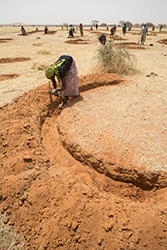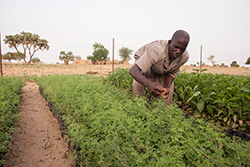Collaboration with the UN Convention to Combat Desertification on DLDD and LDN
 FAO is helping raise awareness of the urgent need to fully implement the United Nations Convention to Combat Desertification (UNCCD), including by generating on-the-ground information, data and tools on land desertification, land degradation and drought (DLDD). FAO is also providing policy options for sustainable land management (SLM), the sustainable management of soil resources, and drought management aimed at achieving land degradation neutrality (LDN), and demonstrating the links between LDN, food security, poverty reduction and the provision of ecosystem services. FAO pursues coherent approaches that address governance, gender and local community aspects within the role and mandate of the UNCCD, including through partnerships with other international organizations and cooperative efforts to increase attention to, and funding for, such approaches.
FAO is helping raise awareness of the urgent need to fully implement the United Nations Convention to Combat Desertification (UNCCD), including by generating on-the-ground information, data and tools on land desertification, land degradation and drought (DLDD). FAO is also providing policy options for sustainable land management (SLM), the sustainable management of soil resources, and drought management aimed at achieving land degradation neutrality (LDN), and demonstrating the links between LDN, food security, poverty reduction and the provision of ecosystem services. FAO pursues coherent approaches that address governance, gender and local community aspects within the role and mandate of the UNCCD, including through partnerships with other international organizations and cooperative efforts to increase attention to, and funding for, such approaches.
DLDD was one of the crucial global issues to emerge from the Rio process in 1992, and it was instilled with a sense of urgency at Rio+20 because of concern that ecosystems were becoming degraded beyond their carrying capacity, affecting especially the livelihoods of the rural poor, reducing their resilience, and threatening the goal of food security for all. Even greater economic, social and environmental costs are expected in the future unless DLDD is fully addressed.
At the second meeting of the Inter-agency Expert Group on SDG [Sustainable Development Goal] Indicators in October 2015, FAO and the UNCCD Secretariat agreed to jointly monitor “trends in land degradation” as a priority indicator for Target 15.3 on LDN, providing the necessary metrics and building on the existing monitoring and assessment mechanisms of the UNCCD.
 The experience accumulated by FAO over decades includes on-the-ground support for the use and management of national statistics for monitoring the state of natural resources and agriculture. FAO’s spatially explicit information system integrates earth observation satellite data with on-the-ground information.
The experience accumulated by FAO over decades includes on-the-ground support for the use and management of national statistics for monitoring the state of natural resources and agriculture. FAO’s spatially explicit information system integrates earth observation satellite data with on-the-ground information.
Coordination and collaboration between FAO and the UNCCD Secretariat is achieved through:
- the SDG process under SDG target 15.3 on LDN;
- the Global Land Outlook study, with FAO staff providing peer review services and assisting in the development of a chapter on soil resources;
- scientific coordination, especially on soil resources, between the UNCCD Science–Policy Interface and the Intergovernmental Technical Panel on Soils of the Global Partnership on Soils;
- cooperation in TerrAfrica; and
- the FAO–UNCCD Coordination Mechanism housed in Rome.
